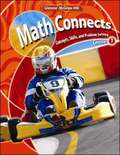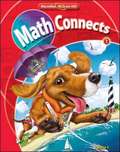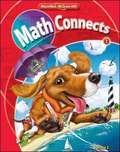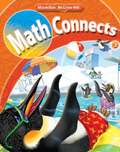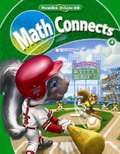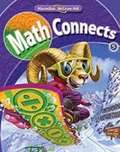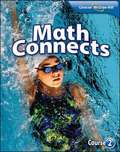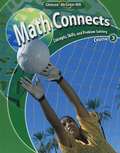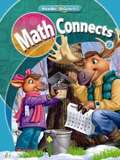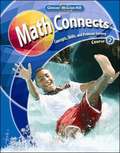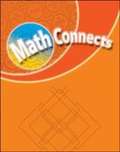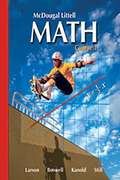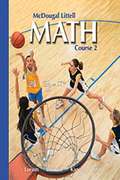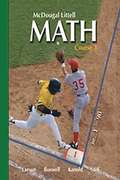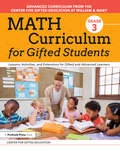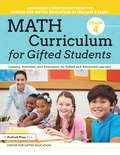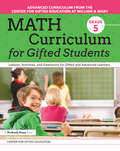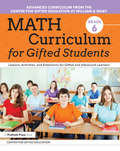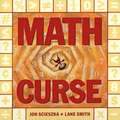- Table View
- List View
Math Connects, 1, Volume 2
by Altieri Balka DayIt's All Connected Math Connectsis intended for use in all elementary math classes as a balanced approach to teaching mathematics.Math Connectsis the elementary portion of the vertically aligned PreK to 8Math Connectsprogram from Macmillan/McGraw-Hill and Glencoe. This program is designed to excite your students about learning mathematics while at the same time providing you, the teacher, with all the tools and materials you will need to teach the program. Your students will be motivated as they solve real-world problems such as creatures under the sea; emperors of the ice; and roller coaster physics. A variety of teacher materials are available to meets the needs of all your students, from early finisher to English learner
Math Connects, Course 1: Concepts, Skills, and Problem Solving
by Day Frey HowardNIMAC-sourced textbook
Math Connects, Course 3: Concepts, Skills, and Problem Solving
by Day Frey HowardNIMAC-sourced textbook
Math Connects, Grade 2, Volume 2
by MacMillan/McGraw-Hill Staff<p>Math Connectsis intended for use in all elementary math classes as a balanced basal approach to teaching mathematics. Math Connects is the elementary portion of the vertically aligned PreK to 8 Math Connects program from Macmillan/McGraw-Hill and Glencoe. This program is designed to excite your students about learning mathematics while at the same time providing you, the teacher, with all the tools and materials you will need to teach the program. <p>Your students will be motivated as they solve real-world problems such as creatures under the sea; emperors of the ice; and roller coaster physics. A variety of teacher materials are available to meets the needs of all your students, from early finisher to English learner. </p>
Math Connects: Course 2
by Mcgraw-Hill GlencoeA 6-8 math curriculum designed to provide students the content to succeed in high school math.
Math Connects: Course 3
by Glencoe Mcgraw-HillSkills Practice Workbook for Grade 8 focuses on skills practice for each lesson as additional practice or for second-day teaching of the lesson.
Math Connects: Transition Masters
by Macmillan McGraw-HillMath Connects: Grade 3 Transition Masters
Math Curriculum for Gifted Students: Lessons, Activities, and Extensions for Gifted and Advanced Learners: Grade 3
by Margaret Jess Mckowen PattiThe Math Curriculum for Gifted Students series:Provides gifted and advanced learners with challenging activities to extend their mathematical thinking.Includes lessons, activities, and extensions that are aligned to national standards.Is designed to provide high-ability learners advancement beyond the general curriculum.Is ideal for gifted classrooms or gifted pull-out groups.Was developed by the Center for Gifted Education at William & Mary.In Math Curriculum for Gifted Students (Grade 3), the 21 lessons cover mathematics content for grade 3 and are divided into five sections: number and operations in Base Ten, operations and algebraic thinking, number and operations-fractions, measurement and data, and geometry. Each lesson includes a teacher page that outlines the estimated time, key terms, materials, and objectives; a challenging activity to allow students to explore the concepts in depth; practice problems; and an assessment similar to standards-based grade-level standardized assessments.Optional Student Workbook PacksIn addition to this teacher's guide, companion student workbooks are available in sets of 5, which cover number/operations in Base Ten and operations/algebraic thinking (Grade 3
Math Curriculum for Gifted Students: Lessons, Activities, and Extensions for Gifted and Advanced Learners: Grade 4
by Molly Bryan TalbotThe Math Curriculum for Gifted Students series:Provides gifted and advanced learners with challenging activities to extend their mathematical thinking.Includes lessons, activities, and extensions that are aligned to national standards.Is designed to provide high-ability learners advancement beyond the general curriculum.Is ideal for gifted classrooms or gifted pull-out groups.Was developed by the Center for Gifted Education at William & Mary.In Math Curriculum for Gifted Students (Grade 4), the 24 lessons cover mathematics content for grade 4 and are divided into five sections: number and operations in Base Ten, operations and algebraic thinking, number and operations-fractions, measurement and data, and geometry. Each lesson includes a teacher page that outlines the estimated time, key terms, materials, and objectives; a challenging activity to allow students to explore the concepts in depth; practice problems; and an assessment similar to standards-based grade-level standardized assessments.
Math Curriculum for Gifted Students: Lessons, Activities, and Extensions for Gifted and Advanced Learners: Grade 5
by Center for Gifted Education Margaret Jess McKowen PattiThe Math Curriculum for Gifted Students series:
Math Curriculum for Gifted Students: Lessons, Activities, and Extensions for Gifted and Advanced Learners: Grade 6
by Center for Gifted Education James M. MoroneyThe Math Curriculum for Gifted Students series:
Math Curse
by Jon Scieszka Lane SmithWhen the teacher tells her class that they can think of almost everything as a math problem, one student acquired a math anxiety which becomes a real curse.
